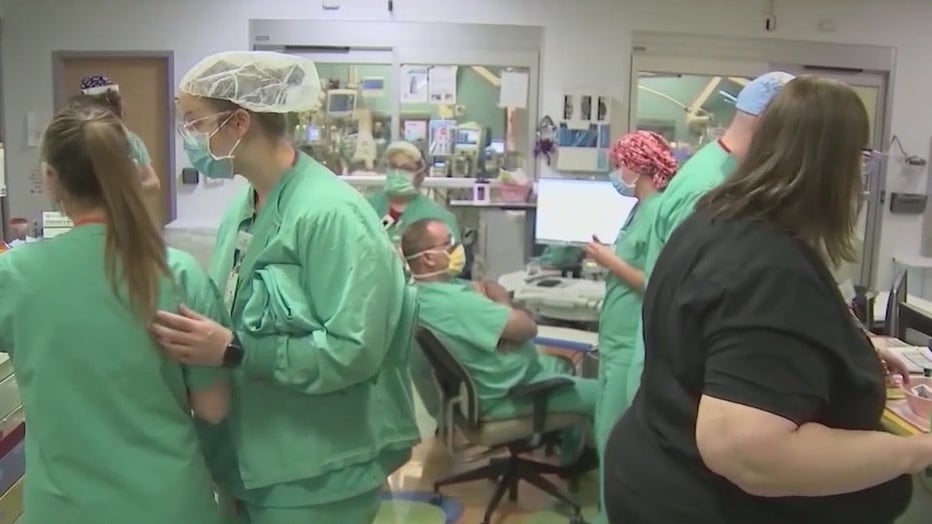Arizona nurse shortage sidelines non-COVID patient transfers

COVID-19 pandemic leaves young Valley child without a father
A Valley widow is speaking out, weeks after her husband and the father of her child lost his battle with COVID-19. FOX 10's Justin Lum reports.
PHOENIX - An ongoing nursing shortage in Arizona will likely keep non-COVID-19 patients from quickly getting transferred to more equipped hospitals.
State health officials this week rejected a request to expand the state "surge line," a call-in system to find beds for critically ill COVID-19 patients, to include people with other medical needs, the Arizona Daily Star reported.
"While the Arizona Surge Line has facilitated the transfer of COVID-19 patients for the majority of requests, a small percentage of transfer requests in the last week are still pending due to statewide hospital staffing shortages," Don Herrington, the state Department of Health Services interim director, wrote.
Gov. Doug Ducey’s administration established the surge line last year to better facilitate transfers of patients who were extremely sick with COVID-19.

In recent months, smaller or more rural hospitals have complained of being unable to get patients in dire need of surgery or other medical care into hospitals in Tucson or Phoenix.
Meanwhile, the state dashboard on Sept. 23 reported 3,013 new confirmed COVID-19 cases and 69 more deaths.
Since the pandemic began, Arizona has seen in total 1,075,876 cases and 19,727 deaths.
The leaders of the state’s largest hospital systems say their hospitalizations are mostly unvaccinated people.
In Arizona, only 57.5% of the eligible population — or more than 4.1 million — have gotten at least one dose of the vaccine.
MORE: Coronavirus in Arizona: Latest case numbers
In order to protect yourself from a possible infection, the CDC recommends:
- Avoid close contact with people who are sick.
- Avoid touching your eyes, nose, and mouth.
- Stay home when you are sick.
- Cover your cough or sneeze with a tissue, then throw the tissue in the trash.
- Clean and disinfect frequently touched objects and surfaces using a regular household cleaning spray or wipe.
- Cover your mouth and nose with a cloth face cover when around others
- Wash your hands often with soap and water for at least 20 seconds, especially after going to the bathroom; before eating; and after blowing your nose, coughing, or sneezing.
- Monitor your health daily
Symptoms for coronavirus COVID-19 include fever, coughing, and shortness of breath. These, of course, are similar to the common cold and flu.
Expect a common cold to start out with a sore or scratchy throat, cough, runny and/or stuffy nose. Flu symptoms are more intense and usually come on suddenly, and can include a high fever.
Symptoms of COVID-19 may appear more slowly. They usually include fever, a dry cough and noticeable shortness of breath, according to the World Health Organization. A minority of cases develop pneumonia, and the disease is especially worrisome for the elderly and those with other medical problems such as high blood pressure, obesity, diabetes or heart conditions.
RELATED: Is it the flu, a cold or COVID-19? Different viruses present similar symptoms
To protect yourself, wash your hands well and often, keep them away from your face, and avoid crowds and standing close to people.
And if you do find yourself showing any of these flu or coronavirus symptoms - don't go straight to your doctor's office. That just risks making more people sick, officials urge. Call ahead, and ask if you need to be seen and where.
More COVID-19 in Arizona news
- Phoenix woman dies from COVID-19 weeks after giving birth; child's father remembers the love of his life
- Arizona reports over 70 more COVID-19 deaths for 2nd day in a row
- COVID-19 in Arizona: Hospitals struggle to care for patients due to the unvaccinated
Tune in to FOX 10 Phoenix for the latest news:
Get breaking news alerts in the FREE FOX 10 News app. Download for Apple iOS or Android.

